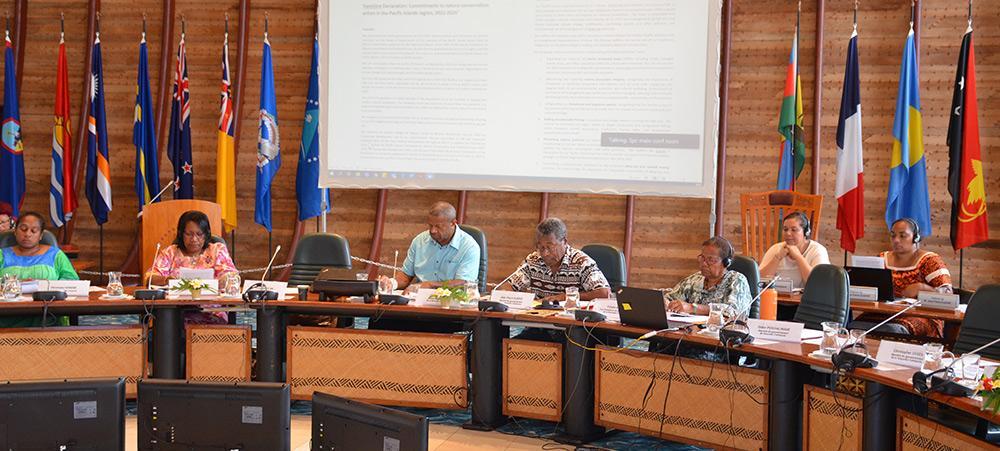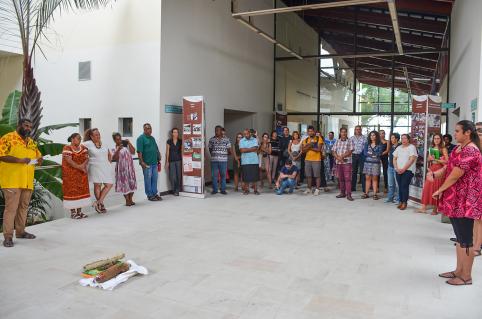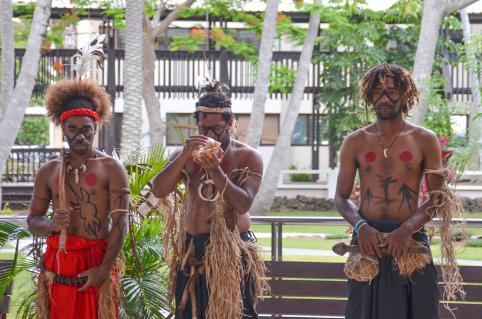The Pacific Region Commits to Nature Conservation
30 November 2020

Mission accomplished for the 10th Pacific Island Conference on Nature Conservation and Protected Areas with the adoption on November 26 of the Vemööre Declaration, a first in the history of this event. This text is accompanied by commitments and recommendations to international leaders.
"We, the government representatives of 13 Pacific Island states and territories, our partner countries, and the leaders of 11 member organizations of the Pacific Round Table for Nature Conservation, gathered at the 10th Pacific Island Conference on Nature Conservation and Protected Areas, declare the urgency of the global biodiversity crisis and that actions for change be implemented without delay. This crisis threatens the very existence of our Pacific Ocean, our islands and our people. "The Vemööre Declaration"* begins with this strong statement. A state of emergency accentuated by the Covid-19 pandemic which "tragically reminds us that all our societies depend on the health and resilience of natural ecosystems", continues the preamble. The text was unanimously adopted by the Environment Ministers of the partner countries of the Pacific Regional Environment Programme and the members of the Pacific Islands Round Table on November 26 during a sequence, organized from New Caledonia, the host country of the event, in a virtual format due to the health crisis.
A Binding Document
"The Pacific region is the first region in the world to come together to make proposals for action on nature conservation and to make commitments to achieve these goals," said Jean-Pierre Djaïwé, Minister for Environmental Issues, who chaired the session. Structured around three main pillars - our ocean, our islands, our connection to nature and implementation - the Declaration sets out 21 courses of action (download the full Declaration) before concluding with a real call for mobilization. During the Ministerial Segment, countries and territories also made commitments that will be annexed to the text. For example, the participants expressed the will to strengthen fisheries management through the use of technologies and transparency for sustainable fishing, to reduce the importation of plastics and ban single-use plastics, to establish new marine or terrestrial protected areas, to develop partnerships and regional cooperation programs or to rely on local populations to define and implement conservation actions, while respecting their cultures
Making the Sure the Voice of the Pacific is Heard
More than 1,800 people followed the sessions and debates from the virtual platform of the 10th Pacific Island Conference. "What is important to remember is the participation and inclusion of all stakeholders: youth, managers, research, regional organizations, development partners, customary people, NGOs, political leaders ..., welcomed Jean-Pierre Djaïwé. It is together that we will achieve the conservation goals we have set for ourselves and it is together that we will make the voice of the Pacific heard by the world. The Vemööre Declaration, which will be used to govern local policies in the Pacific Islands, will be used in all international negotiations on biodiversity scheduled for 2021. In particular at the IUCN (International Union for Conservation of Nature) World Congress in Marseille and at the COP 15 in Kunming, China.
*A kunié (Isle of Pines) term which means "to bring to life the word, the work, a project, a vision... "and by extension, "to put forward the character of the commitment one makes".
Commitments Specific to New Caledonia
Strengthen the security of ecosystem services by preserving water resources and biodiversity, by implementing the following actions
- increasing biodiversity in agricultural areas through the development of agroforestry ;
- protection of water resources and reduction of diffuse pollution, particularly within the water protection perimeters;
- conservation of migratory species including birds, turtles and marine mammals.
A New Regional Framework
The 2021-2025 Framework for Nature Conservation and Protected Areas in the Pacific Island Region, the main regional strategy document, was also discussed at the conference. This guide is based on eight principles for nature conservation activities in the Pacific and is a kind of code of conduct. It presents the regional priorities in the form of six strategic objectives for the period 2021-2025, broken down into courses of action that were approved and included in the Vemööre Declaration. While this new framework does not fundamentally change in form compared to the 2014-2020 framework, there are changes in substance. Thus, at the request of partner countries and territories, the courses of action are illustrated with examples of best practices to achieve the objectives, while partners and key actors are identified. The new strategic document also reaffirms the link between the oceans and the climate, as well as the need to better take into account and rely on the solutions provided by nature itself for its conservation.
A public consultation on the document is underway for a few days: https://www.pacificnatureconference.com/framework-for-conservation


